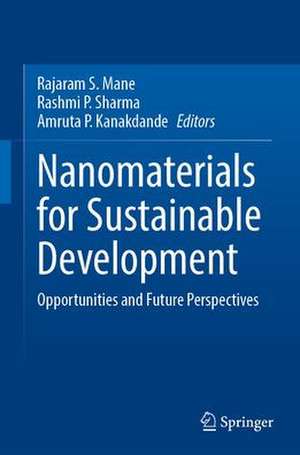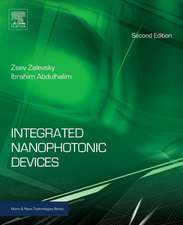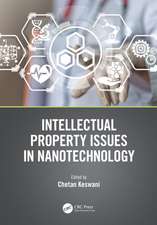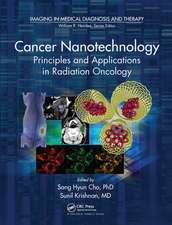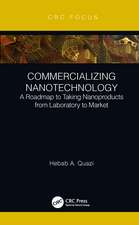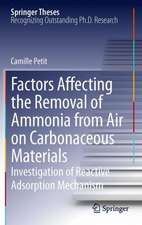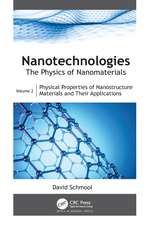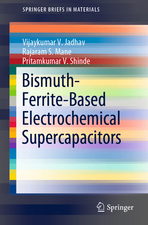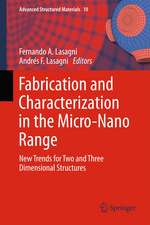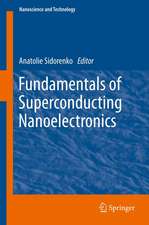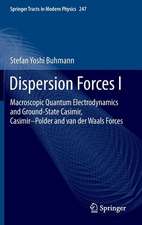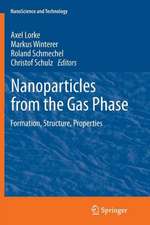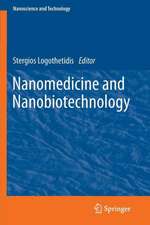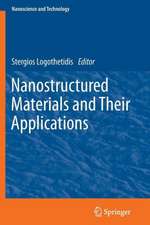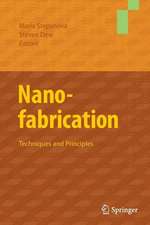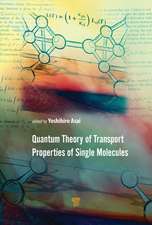Nanomaterials for Sustainable Development: Opportunities and Future Perspectives
Editat de Rajaram S. Mane, Rashmi P. Sharma, Amruta P. Kanakdandeen Limba Engleză Hardback – 19 mai 2023
Preț: 1007.97 lei
Preț vechi: 1229.24 lei
-18% Nou
Puncte Express: 1512
Preț estimativ în valută:
192.87€ • 201.37$ • 159.63£
192.87€ • 201.37$ • 159.63£
Carte tipărită la comandă
Livrare economică 04-18 aprilie
Preluare comenzi: 021 569.72.76
Specificații
ISBN-13: 9789819916344
ISBN-10: 9819916348
Ilustrații: VI, 334 p. 72 illus., 66 illus. in color.
Dimensiuni: 155 x 235 mm
Greutate: 0.68 kg
Ediția:2023
Editura: Springer Nature Singapore
Colecția Springer
Locul publicării:Singapore, Singapore
ISBN-10: 9819916348
Ilustrații: VI, 334 p. 72 illus., 66 illus. in color.
Dimensiuni: 155 x 235 mm
Greutate: 0.68 kg
Ediția:2023
Editura: Springer Nature Singapore
Colecția Springer
Locul publicării:Singapore, Singapore
Cuprins
1. Chemical and physical and Biogenic Synthesis methods for Nanomaterials.- 2. Biosensor: Tools and techniques for characterization and analysis.- 3. Nanomaterials for Toxicity constraints and Risk assessment.- 4. Surface-modified nanomaterials for biogenic applications.- 5. Nano-antimicrobial materials: Alternative antimicrobial approach.- 6. Antiparasitic activity of nanomaterials.- 7. Cancer diagnosis and treatment with nano-approaches
Notă biografică
Prof. Rajaram S. Mane received his Ph.D. in Physics from the Shivaji University, Kolhapur, India, in 2000 and worked as a postdoctoral fellow at Hanyang University, Korea. He also was on the research faculty of Oxford University, Oxford, UK. Since 2010, he has been a professor at the S.R.T.M. University, Nanded, India, and a visiting professor at Pusan National University, Korea. With more than 388 research articles, 10000 citations, an i10 index of 223, and h-index of 51, his major interests include synthesis of novel nanostructures for energy conversion and storage device technologies, nanobiotechnology applications in medicine and agriculture, in particular the use of metallic nanoparticles as a new generation of antimicrobials.
Dr. Rashmi P. Sharma, is presently working as an assistant professor at Deogiri College Aurangabad, Maharashtra, India. She received her Ph.D. degree in biotechnology from S. R. T. M. University, Nanded, India in 2020. She has also profoundly supportedand supervised research scholars in nanoformulation development, and bioremediation studies to completing their master degree dissertations. Her special interests include the nanofabrication of novel materials from bio-waste for the antimicrobial formulation, agricultural application, and waste-water treatment.
Dr. Amruta Prakasrao Kanakdande is currently working as Assistant Professor in the Department of Biotechnology, School of Life Sciences, SRTM University Nanded, India. She has thirteen years of Teaching and Research experience in Biofuel production using biogenic wastes, biosurfactant for Enzymology. Her research interests in the synthesis of biogenic nanomaterials for bioenergy and biofuel production.
Dr. Rashmi P. Sharma, is presently working as an assistant professor at Deogiri College Aurangabad, Maharashtra, India. She received her Ph.D. degree in biotechnology from S. R. T. M. University, Nanded, India in 2020. She has also profoundly supportedand supervised research scholars in nanoformulation development, and bioremediation studies to completing their master degree dissertations. Her special interests include the nanofabrication of novel materials from bio-waste for the antimicrobial formulation, agricultural application, and waste-water treatment.
Dr. Amruta Prakasrao Kanakdande is currently working as Assistant Professor in the Department of Biotechnology, School of Life Sciences, SRTM University Nanded, India. She has thirteen years of Teaching and Research experience in Biofuel production using biogenic wastes, biosurfactant for Enzymology. Her research interests in the synthesis of biogenic nanomaterials for bioenergy and biofuel production.
Textul de pe ultima copertă
This book highlights recent advances in variety of nanomaterials classes including metal chalcogenides, metal oxides/hydroxides, polymer, metal-organic frameworks, and hybrid nanostructures, with a focus on their properties, synthesis methods, and key applications. It also offers detailed coverage on the toxicity aspects with possible solution. Additionally, it provides complete and comprehensive information on surface modification strategies of nanoparticles to achieve desired outcomes. This book discusses potential applications and major challenges of using these nanomaterials in the fields of biomedical sciences, agricultural industry, bioenergy, biofuel production, and environmental remediation, etc. Overall, this book provides crucial background in nanobiotechnology that compliments the understanding of experimental design for the production of more customized nanomaterials to avail desirable benefits.
Caracteristici
Presents recent advances in metal chalcogenides, metal oxides/hydroxides, polymer, MOFs, and hybrid nanostructures Discusses their toxicity aspects and provides possible solutions Highlights the surface modification strategies of nanoparticles to achieve desired outcomes for various applications
